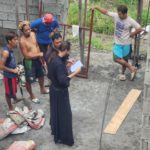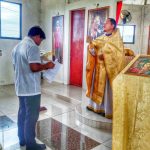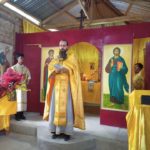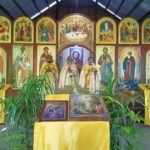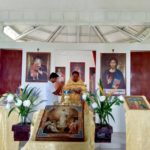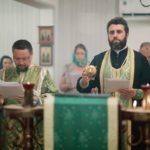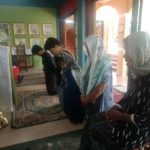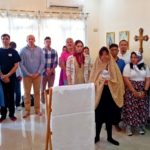During the coronavirus pandemic the Church has to make innovative decisions in order to comply with the instructions of the authorities, to protect not only the physical life and health of people, but also the spiritual one. Metropolitan Hilarion of Volokolamsk, head of the Department for external Church relations of the Moscow Patriarchate, told RIA Novosti in an exclusive interview about his view on the second address of the President to the Russians and new measures to combat the epidemic, on the possibility of combining them with Church life, the upcoming Holy week and the celebration of Easter (this year on April 19).
— Vladyka, how would you comment on the second address of the President in connection with the spread of the coronavirus and new measures to combat the epidemic, in particular, the extension of the non-working period until April 30?
— An important and timely request. The President does everything to save people’s lives. Extending the weekend for another month will bring multibillion losses to the country, reduce the pace of economic development, and hit the wallets of ordinary citizens. This has already happened. But people’s lives are above all else, and no amount can compensate for the lives that will be lost as a result of non-compliance with sanitary measures. Therefore, I strongly support the strict measures that are being introduced. Every life has value, and any life saved is more important than economic achievements. We are seeing an increase in the number of people infected and dying, but let’s not forget that if there were no such measures, the numbers would be very different. The President stressed that if the situation allows, the quarantine period will be shorter. We would like that very much. But we understand that the peak of the disease is probably still ahead, and we need to do everything to make sure that as few people as possible are infected.
— How will the long-term nationwide quarantine affect the income of clergy, many of whom have large families, and will churches go bankrupt?
— The Church will not leave its priests and their families in this difficult situation. Maybe this whole situation will allow the society to finally fix in their minds the fact that Yes, the parish feeds the priests. The media, especially the so-called opposition and liberal media, constantly spread stories about the allegedly fabulous income of the clergy, about the limousines that priests allegedly drive around in. But there is none of this — no fabulous income. Most priests, with a few exceptions, live very modestly. And the Church exists solely on the donations of parishioners, it does not receive any subsidies from the state. Of course, the church will not go bankrupt, but in parallel with the sharp reduction in income, which is inevitable, we will have to reduce spending. Somewhere, perhaps, it will be possible to organize the submission of memorial notes online and the transfer of donations online. Only it is very important that no price lists appear anywhere: this costs so much, and this-so much. Donations can only be voluntary, and the amount must be determined by the donor. And if he can’t donate anything at all, then that shouldn’t be an obstacle to accepting a commemoration note from him.
— How can the Church support the parishionners, and what kind of support do you expect from the faithful?
— All social services of parishes, courtyards and monasteries are instructed by the Patriarch to provide assistance to those people who are at risk, if possible. What kind of help can it be? Delivery of food and medicine. Of course, this includes pastoral support on an individual basis, in compliance with all the rules of individual protection. In other words, priests will come to the homes of the elderly and the sick in order to confess, give communion, and assist them, as they always did before the introduction of sanitary measures.
Every situation of crisis is also a situation for new opportunities. Today, our faithful have a unique opportunity to create what the Apostle Paul called a “home Church”. After all, the Christian family is a Church in miniature. Jesus Christ said: “Where two or three are gathered in My name, there I am in the midst of them” (Matt. 18: 20). He didn’t say, “where a hundred or two hundred or five hundred people will gather,” but he said, “two or three.” Where do people most often gather in twos and threes? In the family. Now is the time to think: do we often pray together with our loved ones, children, and parents? After all, in many families, the day begins with a fuss: children are in a hurry to go to school, dad and mom – to work, to have time to eat, but not to be late for the bus. And there is no time to pray. And in the evening, everyone is tired, I want to talk and watch TV. Well, it seems like, and again I have no time to pray, and I’m getting sleepy. Building a home Church is the most important task of every Christian. We often have such a peculiar consumer attitude to the Church: we will submit notes, and the priest will pray. The Church is perceived as a combine of funeral services, where you can come, order a service, get it, and then let life go its own way. Meanwhile, the Church should have a direct continuation in Christian families. Those who have not yet created their own home Church have a unique chance to do it.
— Isn’t it a sin to prepare for holidays and celebrate, even Easter, in such a difficult period for everyone in General? Is the emphasis of the holiday shifting and how do you think?
— On the contrary! The feast of the Resurrection is a celebration of victory over death. We will definitely celebrate Easter, even if we can’t come to the temple. Remember the Soviet times. Not all believers could get to the Church on Easter. Police cordons stood, young people were not allowed in. And there were no live broadcasts of services on TV at that time. Where was Easter celebrated? In their secret home churches, in their families.
— Under the new measures, going to the temple is fined, and any police officer has the right to stop me and turn me around halfway. Is this normal for believers? And if the temple is closer than a hundred meters from the house, closer to the store, then you can enter it or not?
— This is an interesting question, thank you for being open. Much will depend on the region. As well as the clarity of actions of Federal and local authorities. In some regions, there is no quarantine at all. And in Moscow, a self-isolation regime has been introduced, but how it works in practice is not yet clear to everyone. At first they said that they would give special passes to employees of those institutions that are not closed. Then they said that there would be no special passes. We are currently preparing our own certificates for clergy and Church workers.
— Will the clergy continue to serve in monasteries and churches on Easter and in General every day, as usual, until April 30, or will something change?
— Services in monasteries and parishes do not stop for a day. There is a lot of misinformation about this right now. Here somewhere even with a reference to me wrote that the sacrament of Communion will not be performed. That’s not true, I didn’t say that. All services and all sacraments will be performed. But the issue of admitting believers to churches will be resolved differently in each region and in each diocese, depending on the epidemiological situation. Somewhere there may be a situation that you will have to serve behind closed doors. Somewhere, a small number of believers may be allowed to be present at the same time.
— How do you think the situation will develop further, especially palm Sunday (April 12), Holy week (from April 13) and Easter (April 19)? If I, for example, want to come and light a candle and hand over notes — will they let me in?
— As I have already said, the doors of all churches in Moscow are currently open, but the Patriarch urged the laity to stay at home. And in other regions-in different ways. It is not yet clear how the situation will develop in each particular region. Therefore, the most correct thing is to stay at home, do not go out, and observe a self-isolation regime. I think that before Holy week, each diocese will adopt and voice recommendations regarding the possibility or impossibility of visiting the Church.
— Consecration of cakes, eggs, exchange of gifts, common meals – can all this be canceled? How then can people express their joy and share it?
— A common family meal — why not? Inside their home Church, each family can bake Easter cakes and dress up on Easter night after watching the broadcast of the Patriarchal Easter service from the Cathedral of Christ the Saviour. And if it happens that somewhere it will not be possible to bless cakes, eggs and Pascha (Easter sweet cheese with raisins), then you will have to imagine how during the seventy years of Soviet period, many believers were deprived of this opportunity. And when next year we all come to bless the cakes, we will remember once again this year of the Easter lock and will be glad that many of us did not appreciate: the opportunity to freely come to the temple and pray together. Let’s not dramatize the situation. Several generations in our country have lived in conditions of persecution of the Church. In the 1930s, most of the churches were closed, the priests were shot, and in many cities and villages it was impossible to come to the Church, take communion, or baptize a child. And so the Church lived for decades. Now, thank God, none of this is happening. We have complete freedom to live a full Church life. We are only temporarily in a situation where we are prescribed self-isolation. Let’s go through this time with humility and calm. Let’s work together to save as many lives as possible. For this, the Lord will reward each of us. But carelessness will be punished.
04/04/2020

